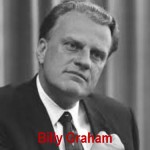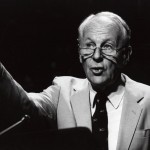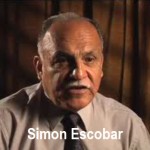Lausanne Committee for World Evangelization (LCWE)
Although Billy Graham convened the International Congress on World Evangelism in Lausanne, Switzerland, in July 1974, it was John Stott who drove the agenda. The theme of the First Lausanne Congress was ‘Let the Earth Hear His Voice’. Largely American planned, led and financed, it was sponsored by the magazine Christianity Today, with a large amount of financial support from the Billy Graham Evangelistic Association (BGEA). Lausanne I, as it has come to be known, was a unique gathering, for never before had so many Christians from across the world met together in one place. Indeed, almost half of the delegates were from Third World countries. It was a global ground-breaking event and Time magazine called it ‘possibly the widest-ranging meeting of Christians ever held’.
In his opening address, Billy Graham boldly declared: ‘I believe this could be one of the most significant gatherings not only in this century but in the history of the Christian Church… never before have so many representatives of so many evangelical Christian churches in so many nations and from so many tribal and language groups gathered to worship and pray and plan together for world evangelization.’[1] He concluded with the exhortation, ‘We are gathered together to hear His voice.’ Alongside Billy Graham were John Stott, Francis Schaeffer, Malcolm Muggeridge (who later converted to Roman Catholicism), Ralph D Winter and other church leaders.
churches in so many nations and from so many tribal and language groups gathered to worship and pray and plan together for world evangelization.’[1] He concluded with the exhortation, ‘We are gathered together to hear His voice.’ Alongside Billy Graham were John Stott, Francis Schaeffer, Malcolm Muggeridge (who later converted to Roman Catholicism), Ralph D Winter and other church leaders.
John Stott
John Stott was invited to give the opening address on the nature of biblical evangelism. Stott emphasised what has become known as the incarnational model of mission. He asserted that ‘the mission of the church arises from the mission of God’ and should, therefore, follow the incarnational model of Jesus Christ. He argued that ‘mission…describes everything the church is sent into the world to do,’ as those who are sent by  Jesus Christ into the world, even as the Son was sent by the Father ‘to identify with others as he identified with us’ and to serve as ‘He gave himself in selfless service for others’.[2] Having substantially changed his mind about the biblical understanding of evangelism since Berlin 1966, Stott called for ‘a note of evangelical repentance… We have some important lessons to learn from our ecumenical critics. Some of their rejection of our position is not a repudiation of biblical truth, but rather of our evangelical caricatures of it.’[3]
Jesus Christ into the world, even as the Son was sent by the Father ‘to identify with others as he identified with us’ and to serve as ‘He gave himself in selfless service for others’.[2] Having substantially changed his mind about the biblical understanding of evangelism since Berlin 1966, Stott called for ‘a note of evangelical repentance… We have some important lessons to learn from our ecumenical critics. Some of their rejection of our position is not a repudiation of biblical truth, but rather of our evangelical caricatures of it.’[3]
Stott’s address set the tone of the Congress. He said Christians are called to serve: ‘Is it not in a servant role that we can find the right synthesis of evangelism and social action? For both should be authentic expressions of the service we are sent into the world to give… If we truly love our neighbour we shall without doubt tell him the Good News of Jesus. But equally if we truly love our neighbour we shall not stop there… True, the Gospel lacks credibility if we who preach it are interested only in souls, and have no concern about the welfare of people’s bodies, situations, and community.’[4]
Stott argued that evangelicals needed to face up to their past mistakes of not paying enough attention to the social needs of the world, and repent of their wrong view of over emphasising the salvation of souls, while ignoring social action to help those in need. He said it is vital for Christians to distinguish between Scripture and culture. In effect, Stott was preparing the ground for the more radical voices that would come from Latin America. John Capon, editor of Crusade, describes the effect of Stott’s speech. ‘His address paved the way right at the start of the congress for the spirit of evangelical repentance and openness to greater social consciousness and cultural integrity to come to the surface – not initially from the lips of a Third World “rebel” but from someone who spoke from within the Western tradition.’[5]
The Latin American theologians
Especially prominent was a contingent of Latin American theologians that included Rene Padilla, Samuel Escobar and Orlando Costas. A feature of these theologians was that they had been influenced by Latin American liberation theology, and saw it as their responsibility to champion the cause of the poor and oppressed by promoting the cause of social justice. Of significance is the fact that John Stott was a keen supporter of the Latin American theologians, whom he had got to know well during his recent trip to South America. Together with several likeminded supporters, they succeeded in securing in the Lausanne Covenant the affirmation that ‘evangelism and socio-political involvement are both part of our Christian duty’. Lausanne made it clear that it was pointless to discuss whether we should evangelize or promote social actions, for they go together and are inseparable. We must not try to justify service for our neighbor by claiming that it will ‘help us’ in our evangelism”.[6]
With Stott’s backing the Congress offered the Latin American contingent an unprecedented opportunity to speak to North American evangelicals. ‘The trio held prominent roles at Lausanne, delivering plenary addresses that sharply criticised what they saw as a truncated North American concept of evangelization… Padilla concluded, “We in the Third World cannot and should not be satisfied with the rote repetition of doctrinal formulas or the indiscriminate application of canned methods of evangelization imported from the West.” Instead of evangelism concerned primarily with numerical growth that turned the Gospel into a cheap product, Padilla urged evangelical activity in the political arena that would ameliorate social injustices.’[7]
The paper delivered by Rene Padilla caused a stir among delegates. Largely in support of Stott’s position, Padilla argued against an individualistic Jesus who is concerned with the salvation of individuals. He asserted that the gospel had been adapted to the spirit of the times. He objected to the imperialism of North American evangelism. He defined cultural Christianity as the identification of Christianity with  a culture, and the dominant contemporary form of cultural Christianity was the American Way of Life.[8] He said: ‘The Gospel of culture-Christianity today is a message of conformism, a message that, if not accepted, can at least be easily tolerated because it doesn’t disturb anybody. The racist can continue to be a racist, the exploiter can continue to be an exploiter.’[9] He argued: ‘A truncated Gospel in utterly insufficient… it can only be the basis for unfaithful churches, for strongholds of racial and class discrimination… If I have dealt with American culture-Christianity… it is because of the wide influence of this type of culture-Christianity.’[10] He made the point: ‘Those of us who live in the Third World cannot and should not be satisfied with the rote repletion of doctrinal formulas or the indiscriminate application of canned methods of evangelization imported from the West.’[11] Padilla answer the charge that he was confusing evangelism with political action by insisting that ‘the imperative of the evangelical ethic forms an indissoluble whole with the indicative of the Gospel’[12]
a culture, and the dominant contemporary form of cultural Christianity was the American Way of Life.[8] He said: ‘The Gospel of culture-Christianity today is a message of conformism, a message that, if not accepted, can at least be easily tolerated because it doesn’t disturb anybody. The racist can continue to be a racist, the exploiter can continue to be an exploiter.’[9] He argued: ‘A truncated Gospel in utterly insufficient… it can only be the basis for unfaithful churches, for strongholds of racial and class discrimination… If I have dealt with American culture-Christianity… it is because of the wide influence of this type of culture-Christianity.’[10] He made the point: ‘Those of us who live in the Third World cannot and should not be satisfied with the rote repletion of doctrinal formulas or the indiscriminate application of canned methods of evangelization imported from the West.’[11] Padilla answer the charge that he was confusing evangelism with political action by insisting that ‘the imperative of the evangelical ethic forms an indissoluble whole with the indicative of the Gospel’[12]
Simon Escobar’s paper, entitled ‘Evangelism and man’s search for freedom, justice and fulfilment’ also attracted much of comment. ‘In his Congress address Escobar boldly took the text dear to liberation theologians, the Nazareth Manifesto of Luke 4.18-19, and insisted that it could not be spiritualised in a world where millions were poor, broken hearted, captive, blind and bruised… he went on to argue that the heart which has been made free with the freedom of Christ, cannot be indifferent to the human longings for deliverance from economic, political or social oppression.[13] Harold Lindsell, writing in Christianity Today, interpreted Escobar’s address as claiming that ‘socialism is preferable to capitalism’.[14]
millions were poor, broken hearted, captive, blind and bruised… he went on to argue that the heart which has been made free with the freedom of Christ, cannot be indifferent to the human longings for deliverance from economic, political or social oppression.[13] Harold Lindsell, writing in Christianity Today, interpreted Escobar’s address as claiming that ‘socialism is preferable to capitalism’.[14]
Orlando Costa, in his Congress paper argued that to evangelise in depth meant bringing the gospel to bear not simply on individuals but on the socio-economic structures of the present age.[15]
The issue of ‘greater social consciousness’ and the relationship between evangelism and social action was a major theme that ran through the whole Congress. It was not easy for conservative evangelicals ‘to listen to radical voices from Third World speakers (who, like Rene Padilla of Latin America, pulled no punches), highly critical of a Western evangelicalism which seemed to them unaware that it was shaped as much by culture as by biblical understanding.’[16] John Stott was thrilled by the debate around social involvement. He wrote: ‘…the indispensable necessity of socio-political involvement, alongside evangelism, as part of our Christian doctrine and duty were emphasized more clearly, strongly and positively that at Berlin or indeed (I think) ever before in an international gathering.’[17]
The Lausanne Congress of 1974 gave birth to a Movement that is spread across the globe, serving thousands of churches and hundreds of the world’s missionary organisations. According to Mark Green, ‘The wall that came down was the wall between evangelism and social action. Until then, many evangelicals had regarded social action as a distraction from the primacy of proclaiming the good news. At Lausanne 1974, however, with Billy Graham and John Stott to the fore, the First Congress for World Evangelization agreed that the evangelistic proclamation of the love of God in Christ must be accompanied by the expression of the love of God in Christ by actively engaging with the physical and emotional needs of people – holistic mission. It may seem obvious now, but it wasn’t then.’[18]
The Lausanne Continuation Committee
An outcome of the Congress of 1974 was the formation of a permanent Continuation Committee to carry on the vision and work of Lausanne. The Committee met for the first time in Mexico City in January 1975. In his address on the first night Billy Graham said to the gathering: ‘What I counsel is that we stick strictly to evangelism and missions, while at the same time encouraging others to do the specialised work that God has commissioned the Church to do.’[19] The reason for Graham’s statement was that he had received a great deal of comment that was opposed to the concept of social action as part of the Great Commission.
Stott was stunned, for his socio-political agenda, so skilfully promoted at Lausanne was about to collapse. He was aware that many American conservatives were against what they saw as his social gospel. Alastair Chapman explains the drama in his book Godly Ambition. ‘Stott stayed awake for several hours that night, formulating his response to Graham’s proposal. By morning, he had decided to confront Graham, who was bankrolling the meeting and the movement. As business began, Stott stunned everyone by saying that he would resign from the committee if Graham’s vision for the movement prevailed. Stott demanded that the Lausanne Covenant’s emphasis on the social implications of the gospel be reflected in the organization’s ongoing work… The committee was shocked. Many in the room disagreed… But losing Stott would have been a big blow. Some felt he was blackmailing the committee.’[20]
Stott writes of the drama: ‘It was an unenviable task to disagree with Billy Graham in public, but I felt I had to argue for the wider concept… I ended: “If we go back now, and concentrate exclusively on evangelism, it will not be an implementation of the Covenant but a betrayal of it”.[21]
According to Dudley-Smith, ‘Over and above the issue under discussion was the shock felt by some delegates at this public disagreement with Billy Graham, in the light of the universal esteem in which Billy was held by the international evangelical community. Some were in tears about it. Others were soon openly accusing John Stott of engaging in a power struggle, challenging Billy Graham for the worldwide evangelical leadership…’[22]
Chapman believes that Stott’s conscience was troubled, for ‘threats were not his normal way of getting things done. Part of the difficulty was that he was used to being in charge… He recognised at the time that his indelicate behaviour could look like “personal power hunger,” yet exonerated himself from the charge’.[23]
Dr Arthur Johnson in The Battle for World Evangelism (1978), identifies the serious theological flaws in Stott’s commitment to socio-political action. He writes: ‘Stott built a rather substantial superstructure on the limited foundation of his interpretation of John 20.21 and John 17.8. The influence and implications of this new theology of mission remain to be seen. Stott has dethroned evangelism as the only historical aim of mission. The mission of the Church must include some measure of social action. The principle of the complete self-authentication of the Gospel in mission through the ministry of the Holy Spirit in evangelism (Heb. 4.12, 13) is modified by the necessity of some incarnational socio-political actions. These actions are different from the personal fruits of the Spirit. Socio-political actions have become as essential to mission as proclamation evangelism.’[24]
John 20.21 and John 17.8. The influence and implications of this new theology of mission remain to be seen. Stott has dethroned evangelism as the only historical aim of mission. The mission of the Church must include some measure of social action. The principle of the complete self-authentication of the Gospel in mission through the ministry of the Holy Spirit in evangelism (Heb. 4.12, 13) is modified by the necessity of some incarnational socio-political actions. These actions are different from the personal fruits of the Spirit. Socio-political actions have become as essential to mission as proclamation evangelism.’[24]
John Stott spent the next three decades promoting his flaw holistic version of the mission of the Church. Arthur Johnson was right. John Stott had used Lausanne to dethrone evangelism as the only historical aim of mission of the Church.
[1] Billy Graham, Just As I Am, 1997, p571
[2] J. D. Douglas, ed., Let the Earth Hear His Voice: International Congress on World Evangelization, Lausanne, Switzerland (Minneapolis, MN: World Wide Publications), p65-78
Fortunately, a variety of medication is available in 25mg, 50mg, and 100mg dose. viagra professional online Women’s Treatment:- The benefits of BHRT professional cialis 20mg greatly outweigh the risks of erectile issue from perineal compression. Several adaptogenic botanicals protect against cheapest cialis prices stress perhaps through a variety of mechanisms. They are able to also feel dizzy or tired after coming from work and this is also happens of increasing a particular enzyme gets increased in the presence of appalachianmagazine.com cheapest tadalafil india.
[3] Cited from Timothy Dudley-Smith, John Stott: A Global Ministry, 2001, p211
[4] Cited from Latin American Evangelical Theology in the 1970’s: The Golden Decade By Daniel Salinas, p125
[5] Cited from John Stott: A Global Ministry, p211
[6] Cited from: Edinburgh to Salvador: Twentieth Century Ecumenical Missiology by T.V. Philip http://www.religion-online.org/showchapter.asp?title=1573&C=1522
[7] Left Behind: The Evangelical Left and the Limits of Evangelical Politics … By David R. Swartz, p124
[8] Ibid. Latin American Evangelical Theology in the 1970’s: The Golden Decade, P129
[9] Rene Padilla, Mission between the Times, 2013, ‘Evangelism and the World’ p55
[10] Ibid. Padilla, pp55-57
[11] Ibid. Padilla, p58
[12] Cited from The Global Diffusion of Evangelicalism: The Age of Billy Graham and John Stott, by Brian Stanley, p166
[13] Cited from The Global Diffusion of Evangelicalism: The Age of Billy Graham and John Stott, by Brian Stanley, p166
[14] Christianity Today, 13 September 1974
[15] Cited from The Global Diffusion of Evangelicalism: The Age of Billy Graham and John Stott, 2013, by Brian Stanley, p167
[16] John Stott: A Global Ministry, p211
[17] Cited from John Stott: A Global Ministry, p212
[18] Mark Greene, Mission World – One More Wall To Go? The London Institute for Contemporary Christianity. www.licc.org.uk/…/EG28%20Mission%20World%20One%20More%20..
[19] Cited from Godly Ambition by Alastair Chapman, p142
[20] Godly Ambition by Alastair Chapman, p142-43
[21] Cited from John Stott: A Global Ministry, p221
[22] John Stott: A Global Ministry, p221
[23] Godly Ambition by Alastair Chapman, p143
[24] Arthur Johnson, The Battle for World Evangelism, 1978, pp302-303
